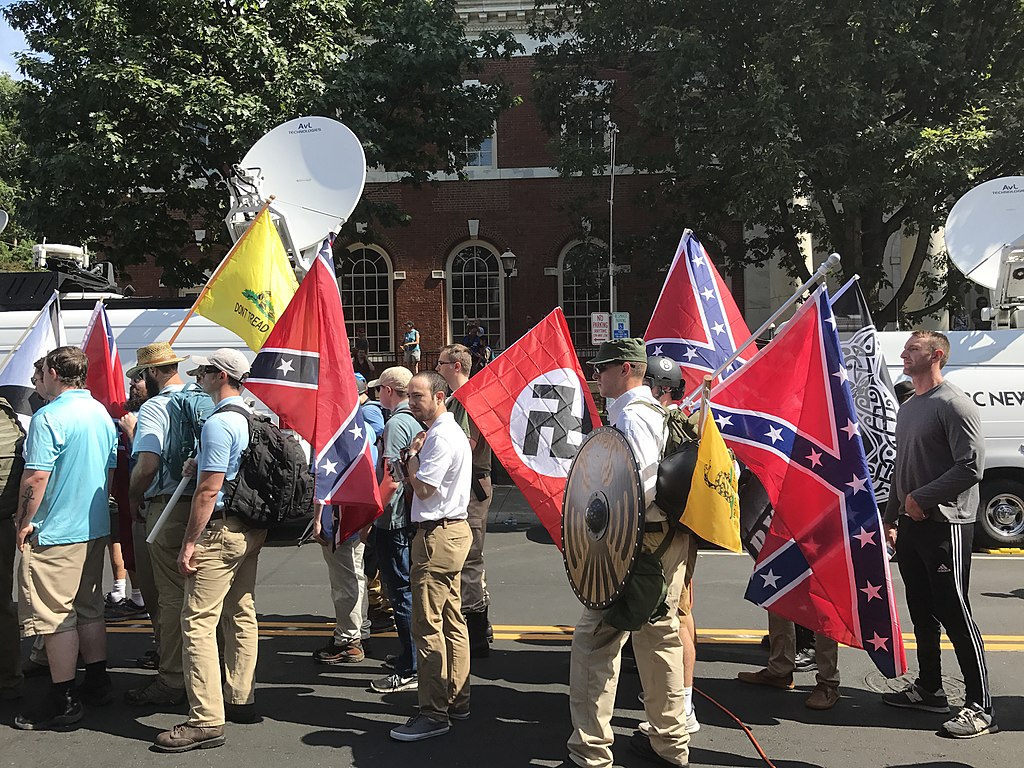Prominent evangelical leaders in the U.S. continue to provide succor to President Donald Trump even after his support for the militant neo-Nazis who rallied in Charlottesville, Virginia on August 12. The event turned deadly when one of the white supremacists drove his car into a crowd of anti-racist counter protestors, killing Heather Heyer and injuring 19 others.
On that same day, Trump said that the counter demonstrators were as much to blame as the heavily-armed neo-Nazis and other racists. He talked about the “egregious display of hatred, bigotry, and violence on many sides — on many sides.” That astonished most people. In Canada, a Globe and Mail newspaper editorial described him as the “protector-in-chief of right-wing racists.” The racists, in turn, were delighted with Trump’s response. “Really, really good,” said neo-Nazi one group. “God bless him.”
“Very fine people”
At a news conference on August 14, Trump briefly qualified his comments at the behest of his advisors, but later he became his own man again and doubled down on his support for white supremacists. He said there were “very fine people” among those who gathered in Charlottesville to protest the potential removal of a General Robert E. Lee Confederate statue. The New York Times and the Anti-Defamation League have identified 150 of those “fine” people and provided comments which have been made by 20 of them.
Here is just one of those comments from Richard Spencer, a prominent leader of the white nationalist movement: “America was, until this last generation, a white country designed for ourselves and our posterity,” he said. “It is our creation, it is our inheritance and it belongs to us.” Of course, Spencer and most of today’s neo-Nazis weren’t around during the Second World War, but they are seeking to revive the ideology of Nazism, which exalts white supremacy and anti-Semitism and they hold that violence and bloodshed are a given.
Corporate leaders resign
Trump’s response to Charlottesville was so crudely audacious that a number of corporate leaders resigned from three of the president’s business-related advisory councils. Trump then chose to dissolve the councils entirely. He didn’t have to dissolve his Committee on the Arts and Humanities because all of its members resigned in protest.
Evangelical advisors remain
Despite those resignations, however, Trump’s 25-member Evangelical Executive Advisory Board remains intact. Most have remained mute but some have praised the president’s equating neo-Nazis with counter demonstrators protesting against that message. “Finally, a leader in the White House,” tweeted Jerry Falwell Jr., one of the advisory board members. “Bold truthful statement about Charlottesville tragedy. So proud of Donald Trump.”
Trump created the evangelical advisory board as part of his run for election in 2016. In return for the influence they hope to project, the board members provide cover for a thrice-married casino owner who has boasted of his sexual conquests and even his assaults. The Guardian newspaper describes the board as “a mix of radical born-again preachers, televangelists and conservative political influencers.” They are entrepreneurs whose business is religion, purveyors of the prosperity gospel which holds that wealth and power are God’s reward to those who deserve them. They, like Trump, are self-made men who answer to no one except themselves. They have no church structures and for them there is no chain of command or hierarchy such as exist in the mainline Protestant and Catholic churches. It is worth noting that there are neither Catholics nor mainline Protestants among Trump’s religious advisors.
Where Trump’s support rests
Trump knows where his support rests. About 25 per cent of Americans describe themselves as evangelical Protestants, which equates to 80 million people. About 60 per cent of evangelicals are whites. The Washington Post estimates that those white evangelicals comprise about 20 per cent of all registered voters, and represent about 33 per cent of the voters who are Republicans. Some have argued that Trump’s small group of hand-picked religious advisors cannot be said to represent the diverse evangelical population. That would be a comforting thought, except that in the 2016 presidential election white evangelicals voted for Trump over Hilary Clinton by a margin of 80-16 per cent. Evangelicals of colour largely preferred Clinton.
There are many reasons posited as to why evangelicals support Trump, given his sexual history, his compulsive lying and his long-term lack of integrity in business dealings. Evangelicals may be prepared to look the other way as long as Trump appoints conservative judges who will roll back abortion and reproductive rights. Evangelicals may be hostile to big government, which they associate with Democrats, although Trump’s promised spending, particularly on the military, would make him the epitome of a big government president. Equally, or more important, is the animus among white evangelicals toward Hilary Clinton, which is odd given that she is a church going United Methodist who taught Sunday school and as a senator regularly attended prayer breakfasts.
How and why
The question, however, is not so much why white evangelical Christians continue to support Trump, but rather how they can possibly continue to do so, given his blatant support for neo-Nazis and white supremacists, and their support for him.
Image: Anthony Crider
Chip in to keep stories like these coming.




